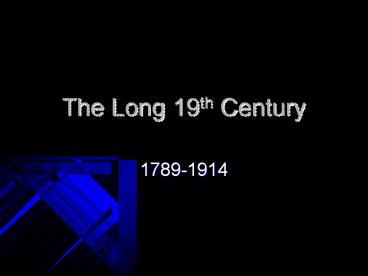The Long 19th Century - PowerPoint PPT Presentation
Title:
The Long 19th Century
Description:
This thesis recognized the dual importance of the French Revolution and the Industrial Revolution as ... industrial (British) revolution ... stratification of ... – PowerPoint PPT presentation
Number of Views:556
Avg rating:3.0/5.0
Title: The Long 19th Century
1
The Long 19th Century
- 1789-1914
2
Dual Revolutions
- Hobsbawm analyzed the early 19th century, and
indeed the whole process of modernization
thereafter, using what he calls the twin
revolution thesis. - This thesis recognized the dual importance of the
French Revolution and the Industrial Revolution
as having given rise to modern European history,
and through the connections of colonialism and
imperialism all of world history.
3
Hobsbawm, The Age of Revolution
- The great revolution of 17891848 was the triumph
- not of liberty and equality in general, but of
the middle class or bourgeois liberal society - not of industry as such, but of capitalist
industry - not of the modern economy or of the modern
state but of the economies and states in a
particular region of the world
4
Hobsbawm, The Age of Revolution
- But it is not unreasonable to regard this dual
revolution the rather more political (French)
and the industrial (British) revolution not so
much as something which belongs to the history of
the two countries which were its chief carriers
and symbols, but as the twin crater of a rather
larger regional volcano.
5
Industrial RevolutionEvolution or Revolution?
- 1st Phase 1740-1860in Britain
6
Why Britain?
- Lack of war/conflict within Britain
- Vast market colonial system excess capital
- Strong, sizeable Navy, merchant fleet
- Access to ports Internal water trade routes
- Favorable government policies
- Private landownership enclosure acts
- Mobile society labor force
- Coal iron resources
7
(No Transcript)
8
(No Transcript)
9
Spinning Jenny
10
Power Loom
11
Newcomen , then Watt
Steam Engine
12
Evolution
- Proto-industrialization to factory system
- Worker/employer relations imbalance in
production - simple, common items (textiles) mass production
- Big profits, unlike France luxury items
- Automation spinning jenny, power loom, steam
engine - Internal Improvements canals (Suez 1869),
steamboats (trans-Atlantic 1838), railroads - Agricultural Revolution reaper thresher,
steel-tipped plow (canning, refrigeration) - Rise of Corporations (easier to raise capital)
13
(No Transcript)
14
(No Transcript)
15
Manchester
16
Impact
- Population growth (poverty)
- Vertical to horizontal stratification of society
- New urban centers Manchester
- Unsanitary, overcrowded, polluted, Child labor
- Laissez Faire ideology among most middle class
(unless favorable to business)
17
Impact on Economics Sociology
- David Ricardo Iron Law of Wages
- Thomas Malthus Food supply population growth
- Herbert Spencer Social Darwinism
18
Ricardos Iron Law of Wages
19
Charles Darwin, from his autobiography. (1876)
- "In October 1838, that is, fifteen months after I
had begun my systematic inquiry, I happened to
read for amusement Malthus On Population, and
being well prepared to appreciate the struggle
for existence which everywhere goes on from long-
continued observation of the habits of animals
and plants, it at once struck me that under these
circumstances favourable variations would tend to
be preserved, and unfavourable ones to be
destroyed. The results of this would be the
formation of a new species. Here, then I had at
last got a theory by which to work".
20
Starting at 1750, 50 year intervals Measure in
Billions
21
Malthus, Essay on the Principle of Population
(1798)
- In nature plants and animals produce far more
offspring than can survive, and that Man too is
capable of overproducing if left unchecked. - Concluded that unless family size was regulated,
man's misery of famine would become globally
epidemic and eventually consume Man. - Not popular among social reformers who believed
that with proper social structures, all ills of
man could be eradicated.
22
Social Darwinism
23
Reform?? The Condition of England Question
- Aristocracy noblesse oblige
- Social Gospel/Christian Socialism
- Robert Owen Utopian Communities
- Temperance Movements
- 1st Phase reform (Sadler Commission, 1832)
- Factory Act of 1833
- Repeal of Combination Acts 1824
- Jeremy Benthams Utilitarianism (late 18th C)
- Socialism Karl Marx Frederich Engels (1848)
24
Jeremy Bentham
- It is the greatest good to the greatest number of
people which is the measure of right and wrong. - It is vain to talk of the interest of the
community, without understanding what is the
interest of the individual. Read more
http//www.brainyquote.com/quotes/authors/j/jeremy
_bentham.htmlixzz1nsOBW07S
25
On the Continent?
- Britain had little competition until 2nd phase
- Slow to change, picked up after 1860
- Napoleonic wars
- Poor transport
- Fewer raw materials
- Internal tools/tariffs
- Investment ungentlemanly
- Required more government involvement
26
Second Phase
- mid 19th century , Technological Revolution
- rapid growth of railroads, steel, steamships,
electricity, chemicals, telecommunications - End of British leadership
- US, Germany leadership
- Japan, France, Low Countries
- larger scale investment in more industries
- beginnings of big corporations dominating
industries, able to invest more money in new
technology - capital industries which produce goods for other
industries, not for consumers
27
Impact
- What do the documents tell us about the impact
industrialization had on - The people and politics of Europe?
- The World?































